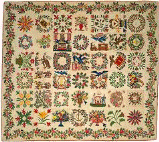Textile Society of America

Textile Society of America: Symposium Proceedings
Date of this Version
10-2020
Document Type
Article
Citation
Published in Hidden Stories/Human Lives: Proceedings of the Textile Society of America 17th Biennial Symposium, October 15-17, 2020. https://digitalcommons.unl.edu/tsaconf/
doi: 10.32873/unl.dc.tsasp.0085
Abstract
The paper investigates the democratic and social values of patchwork quilting through its culture of open-source pattern sharing and communal group work – using The Freedom Quilt Hungary project as a primary example. I facilitated a social engagement artwork, developed in 2019 on the occasion of the 30th anniversary of the end of Socialist rule in Hungary in 1989. This change resulted in new laws, allowing for the formation of the Hungarian Patchwork Guild (HPG), with whom I worked closely to create the work. It provided members of this group and the public with a platform to define individual notions of freedom and free speech in a post-Communist economic system. The resulting work (a quilt made collectively by approximately two hundred fifty people) is made of kékfestö fabric, a folk craft with cultural and political significance in relation to Hungary’s alternating regimes and border changes that have defined the trajectory of this country and practice. I held a series of free public sewing workshops, group conversations, and lectures that linked cultural sources of American quilting--specifically pattern--to work made by the HPG during the last thirty years. Quilt blocks created during the workshops were sewn into the final quilt during a public quilting bee, with HPG members making each decision regarding design and construction techniques by way of majority vote. HPG members from around the country gathered to share the labor intensive handwork in the social manner typical of this tradition that had not been experienced by these quilters until 1989. The explanation of these events will demonstrate how the project adapted the Guild’s tenets of supporting “values neglected by our modern world such as solidarity, quality and community that is open for all” as an organizational structure to provide free education and cross-cultural understanding in a globalized world. The resulting quilt and project ephemera provides an educational resource that archives kékfestö patterns and links stories behind individual quilt blocks to both the underground/hidden and established/public timelines of the country.
Included in
Art and Materials Conservation Commons, Art Practice Commons, Fashion Design Commons, Fiber, Textile, and Weaving Arts Commons, Fine Arts Commons, Museum Studies Commons


Comments
Copyright © 2020 Christalena Hughmanick